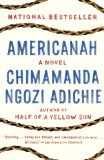Summary | Excerpt | Reading Guide | Discuss | Reviews | Beyond the book | Read-Alikes | Genres & Themes | Author Bio

Fearless, gripping, at once darkly funny and tender, spanning three continents and numerous lives, Americanah is a richly told story set in today's globalized world.
As teenagers in a Lagos secondary school, Ifemelu and Obinze fall in love. Their Nigeria is under military dictatorship, and people are leaving the country if they can. Ifemelu - beautiful, self-assured - departs for America to study. She suffers defeats and triumphs, finds and loses relationships and friendships, all the while feeling the weight of something she never thought of back home: race. Obinze - the quiet, thoughtful son of a professor - had hoped to join her, but post-9/11 America will not let him in, and he plunges into a dangerous, undocumented life in London.
Years later, Obinze is a wealthy man in a newly democratic Nigeria, while Ifemelu has achieved success as a writer of an eye-opening blog about race in America. But when Ifemelu returns to Nigeria, and she and Obinze reignite their shared passion - for their homeland and for each other - they will face the toughest decisions of their lives.
Fearless, gripping, at once darkly funny and tender, spanning three continents and numerous lives, Americanah is a richly told story set in today's globalized world: Chimamanda Ngozi Adichie's most powerful and astonishing novel yet.
Set in America, England, and Nigeria, the novel is broad in scope and analysis. Adichie's power of descriptive detail and character development are on full display. Though the novel occasionally unfurls into raw social commentary, the primary story of Ifemelu's quest for self is beautiful and captivating...continued
Full Review
 (1021 words)
(1021 words)
(Reviewed by Sarah Sacha Dollacker).
Ifemelu remarks that there is no better metaphor for race in America than black women's hairstyles, and the history of Afro-textured hair would seem to support her observation. In Africa, especially prior to the slave trade, hairstyles were used to communicate a variety of messages from status to identity to fertility. Dense, thick, clean and neatly groomed hair was highly prized. Hair stylists were well-versed in a variety of hair designs that helped them to create styles that would conform to the local standards of their villages or tribes. Braiding, which is a multi-million dollar industry in America and Europe today, was, during this time, a free and communal affair, an opportunity for female bonding. Braiding sessions included ...

If you liked Americanah, try these:

by Aria Aber
Published 2025
An electric debut novel about the daughter of Afghan refugees and her year of nightclubs, bad romance, and self-discovery—a portrait of the artist as a young woman set in a Berlin that can't escape its history.
A girl can get in almost anywhere, even if she can't get out.

by Maame Blue
Published 2024
An internationally award-winning writer makes her triumphant American debut in this emotionally powerful story—a potent blend of Queenie and The Vanishing Half—about a woman's journey to uncover a foundational family secret from the childhood she does not remember.
Analyzing humor is like dissecting a frog. Few people are interested and the frog dies of it.
Click Here to find out who said this, as well as discovering other famous literary quotes!